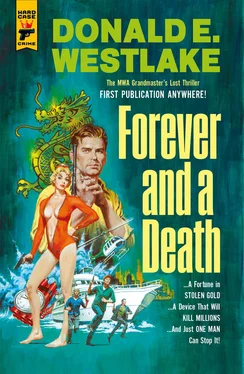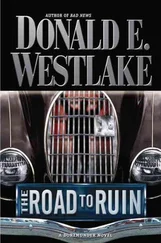The Cobaz River was small but powerful, tumbling down the steep slopes out of Guatemala and down across Belize to empty into the Caribbean Sea, and the hydroelectric dam being built across it up here was as ecologically correct as it was possible for any construction of man to be. True, it would create a small lake where no lake had ever been before, but that was only an improvement. Otherwise, they would merely borrow the water to make electricity, then return it to the river, and the river would remain unchanged.
That had been the most difficult part to explain to the villagers downriver, that the dam had nothing to do with flood control, that the river would still occasionally flood as it always had, that from one-quarter mile below the dam the river would be exactly what it had been before.
The generating system couldn’t have been simpler. A tunnel was cut into the ground beside the lake, twelve feet in diameter, leading downward at a gentle angle. When it came parallel to the dam, inside the mountain, the tunnel became a vertical shaft, tapering smaller, dropping straight down three hundred feet to the blades of the turbines. The water, compressed, hasty, pulled by gravity, pushed by the weight of the lake behind it, hit the turbine with incredible force, enough to generate more electricity than this part of the world would be able to use for years to come.
A red light gleamed on the side of the radio receiver, to show it was working, but otherwise there was absolute silence. Jerry Diedrich had received one phone call earlier in the day from his partner, a man called Luther, merely saying he was on his way back, so Bennett knew the bug in the phone and this receiver were doing their job. But nothing was happening, no phone calls, nothing but the red light in the dusk inside the room, nothing to keep Bennett from reliving again the day of the disaster in Belize.
He was drinking too much in those days, it was part of what made him so genial, such a pleasant guy to be around. He wasn’t a mean drunk or a sloppy drunk, he was a cheerful drunk who made other people happy by his presence. But he was a drunk.
He’d wanted to get to the test. There was to be a test run, releasing the water into the tunnel for the first time, merely a five-minute test to be certain everything was working right, and he’d been eager to get to that test, to sense the power of the water rushing down, to see it come out into the daylight far below the dam, in the new channel they’d cut for it, so that the volume of water they’d borrowed would return to the main body of the river, restoring everything as it had been before. That’s what he’d wanted to see.
The engineers were supposed to be the ones to run the test, but they were taking too long about it. So far as Bennett could see, they were ready, they were at that stage, why delay? He was up at the dam, running the site, while the engineers were half an hour below, in the camp, in the mobile homes they used for offices. He was up there, and he was drunker than he seemed, and he said the hell with waiting. He said seal off the service entrance to the tunnel, and open the entry from the lake. Let’s let that water go!
Some of the workmen spoke Spanish and some Mayan. They all had a little English, which was the only language Bennett had (except for some Singlish, the staccato patois of Singapore, useless in Central America), but whatever language any of the workmen used, they didn’t have enough of it to make their objections plain. The boss insisted; eventually, they shrugged their shoulders and did what the boss said to do.
What he hadn’t known, or possibly what he’d forgotten, was that the tunnel hadn’t yet been entirely cleared out after the construction was done. There were two long folding tables in there, and several chairs, and some Coleman lanterns, and a stack of lumber, and a few other odds and ends.
Darkness fell inside the tunnel when the service entrance was closed, and then the water came thundering through. It snatched up everything that had been left behind, and hurled it all straight down three hundred feet of shaft to the turbine blades, smashing them into useless oars of twisted shining metal.
That was the disaster, or that was as much of the disaster as Richard Curtis knew about, and it had been enough to get Bennett fired that same day, and blacklisted from the entire industry ever since. And Curtis and the others didn’t even know the worst. There had been one thing more left inside the tunnel when Bennett had shut that door and started the water through. A man.
Sometimes in dreams he was that man, Daniel Foster, in that terrifying instant before the water hit. Wide-eyed in the darkness, hearing the roar, the rush of air that would have preceded the water. And then the slam.
There hadn’t been a trace of him, afterward.
“Hello, Mark?”
Bennett sat up straighter. Belize fell away, Singapore crowded in. A new voice said, “Yes. Who’s this?”
“It’s Jerry. Can you talk?”
“Ho ho ho,” Bennett told himself, speaking softly, “is this it?”
Yes, it was. Mark’s young voice said, “Where are you? Are you here?”
“Yes, Luther and me. Can we meet somewhere? Is it safe?”
“No, it isn’t,” Bennett said, and broadly smiled at that warming red light.
“Sure it is,” Mark said. “Nobody suspects a thing, Jerry. Where shall we meet?”
Kim didn’t think it was fair. She was part of this, wasn’t she? She’d gone through as much as anybody on this; more. So why couldn’t she come along to meet this Mark person?
She and Jerry and Luther were having dinner in one of the Indonesian restaurants on Orchard Road, and she spent the entire meal hammering this point. They were in this together, weren’t they? She had as much reason to pursue Richard Curtis as they did; more. So why were they refusing to let her come with them to talk to their friend Mark?
At last, Luther gave her an answer. “Because,” he said, “it’s a gay bar.”
“So what?” she said.
Jerry said, “Kim, you don’t want to go to a gay bar.”
“Why not?”
“You wouldn’t like it.”
“I’ve been in gay bars before,” she said airily.
Sounding interested, Luther said, “Really? Why?”
It had been a lie, of course, quick and thoughtless, and she saw no way to either defend it or explain it, so she pushed forward instead, saying, “Why do you have to meet in a gay bar anyway? Why not somewhere else?”
“Because we are gay,” Luther said, “and so is Mark. So it won’t be suspicious if we all show up there at the same time.”
“But if we showed up with you,” Jerry pointed out, “that would be suspicious.”
“Maybe I’m in drag,” she said, and they laughed, and she saw she wasn’t going to get anywhere. “I’ll want to meet him later, then,” she insisted. “Somewhere that tourists go, or something like that, so it won’t be suspicious.”
“We’ll arrange it,” Jerry promised.
It wasn’t much comfort, but it was all she was going to get, and she knew it.
They insisted on putting her in a cab. “I can walk,” she said. “It’s a beautiful night, it isn’t too far to walk.”
“It is, in fact,” Jerry told her, “but even if it weren’t, you don’t want to be wandering around the city streets after dark.”
“I like the city streets,” she objected, “and I wouldn’t be ‘wandering around,’ I’d be walking from here to Little India, and straight to the hotel.”
Luther said, “Kim, you have enemies in Singapore. You really do have to remember that.”
Which brought her up short. It was true, she did have at least one enemy in Singapore, in Richard Curtis. And Richard Curtis had people everywhere.
Читать дальше







![Дональд Уэстлейк - Enough [A Travesty (novel) and Ordo (novelette)]](/books/416846/donald-uestlejk-enough-a-travesty-novel-and-or-thumb.webp)
